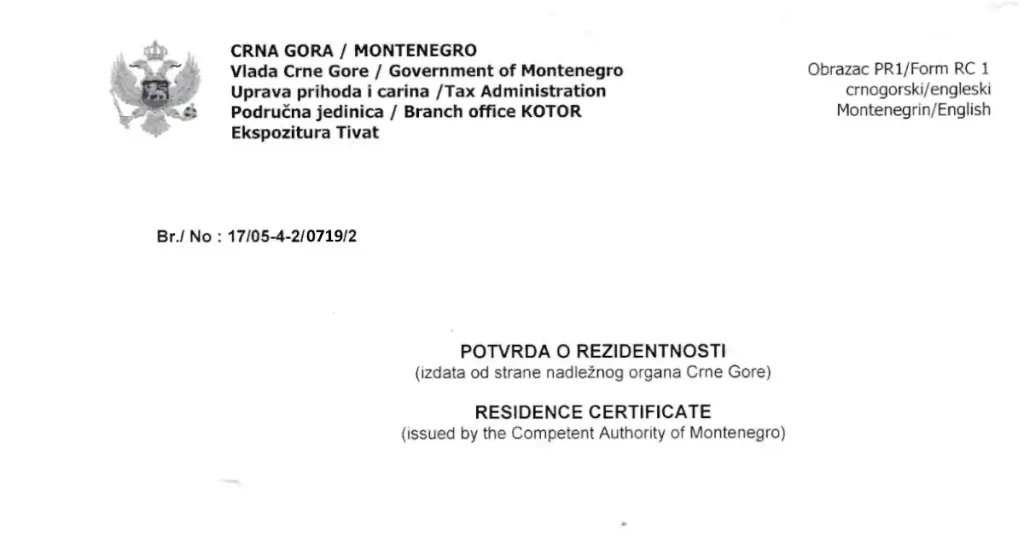Adriacom I Business Services & Immigration
Montenegro Awaits - Let's Make it Yours.
Tax Residency in Montenegro
Simply put, tax residency alludes to the jurisdiction where an individual (or corporation) physically resides and works for most part of the year. Determining your tax residency status is crucial for establishing where you (or your corporation) is liable to pay personal (and corporate) income taxes and file tax returns.
In Montenegro, your fiscal residency status is evaluated based either on your economic and personal ties in Montenegro (such as property ownership or children going to school here) OR the 183 days substantian presence residency rule for the calendar year, where spending more than 6 months in the country does qualify you as a Montenegrin tax resident.
Table of Contents
ToggleTAX RESIDENCY BENEFITS
- Pay income tax at the standard rate of only 15% on dividends, interest, capital gains, royalties, and rental income
- No tax on wealth or on inheritance
- Become a tax resident 183 days after having established legal residency in Montenegro
- Take advantage of available deductions and tax reliefs
MONTENEGRIN TAX RESIDENCY DRAWBACKS
- You pay personal income taxes on your worldwide income
- Possibly taxed twice if your residency status is not properly managed
How to obtain a tax residency certificate
A Tax Residence Certificate (TRC) is an official document issued by tax office branch in the municipality where you are registered as a legal resident. The certificate is valid for one year and includes the taxpayer’s Unique Master Citizen Number alongside other personal information.
The tax residence certificate allows you to claim benefits under a Double Tax Treaty with another country (often your country of citizenship) that may otherwise have the right to tax your income at a higher rate. The process of getting a TRC (‘Obrazac Pr-1’) involves obtaining a temporary residence permit in Monteengro first, and then after 183 days, you can apply for the tax residency with your local tax office.
Obtaining the certificate requires filling out the ZIPR form accompanied by supporting documentation, namely:
- notarized passport copy
- certified copy of your temporary residence permit or permanent residency
- certified work contract with your own or other Montenegro-based company
- property title (original or certified copy) in case temporary residency is based on the purchase of real estate

KEY TAKEAWAYS
- You become tax resident in Montenegro from a practical perspective the moment you obtain your Tax Residency Certificate
- The legal requirements of spending at least 183 days and/or having your center of vital interests in Montenegro is a vague defintion and it may not be worth much in case it is overruled by a Double Tax Agreement with another country
- You must apply for the TRC once a year (for the previous 12 months), and tax residency is never lost unless you let your residence permit in Montenegro expire and move to a another country
- Companies registered in Montenegro are automatically considered Montenegrin tax residents, regardless if they may also be regarded as tax residents of other foreign jurisdictions
What taxes do non-residents pay?
Even if you are considered a non-resident for tax purposes, you’re still obliged to file a tax return if you earn income from sources withinin Montenegro such as rental income and capital gains. Non-residents do so by filing the tax return form GPP-FL, Schedule B.
While tax residents of Montenegro have to pay taxes on their worldwide income, non-residents are only subject to taxes on Montenegrin income on which the tax liability has not been satisfied by the application of a withholding tax rate at the source. For most income earned in Montenegro by non-residents like personal earnings, dividends, and proceeds from royalties and intellectual property, income taxes are withheld from the recipient by the payer, and transferred directly to the tax office.
Need help with obtaining your Tax Residency Certificate?
We can help you do not get taxed twice for just 229€